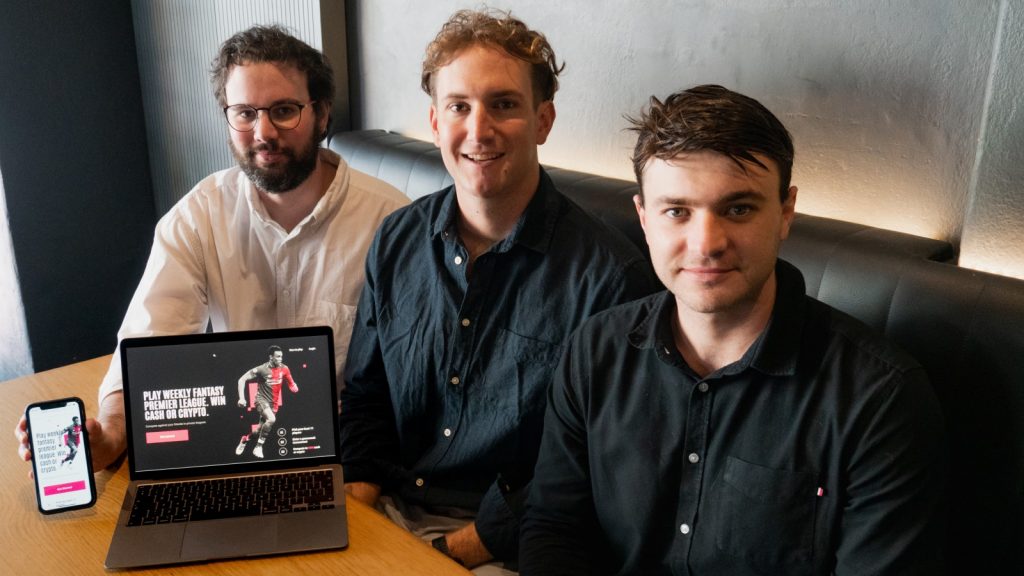What started as a discussion on a couch turned into an idea to launch a South African fantasy football platform by the founders of the Cape Town startup FantasyGo.
The platform, which launched on 16 August, was conceived of and developed during the pandemic — with the four entrepreneurs behind the startup collaborating remotely to launch their product.
No ad to show here.
Ventureburn spoke to the FantasyGo team to find out more about the platform and their journey creating it.
How it started
The idea for FantasyGo came to co-founder Luke Ente when he and co-founder Michael Aylward, former schoolmates, were watching football together a year ago.
“We had always played the normal Fantasy Premier League game — but always encountered the same issues year after year: we would start the season really well but then lose interest,” Aylward told Ventureburn.
“The idea also sparked that there were no other fantasy platforms that offered local sports like rugby, golf, and cricket. This is how the idea of FantasyGo started.”
Ente now heads up finance and operations at the company, while Aylward handles growth and sales.
Later, co-founders Matt Troost and Roland Kesler joined the team.
“We started with just myself and Luke but quickly realised that we needed a technical lead to build the platform. We posted an ad on a number of local universities’ job portals and got quite a few good responses, the best of which was from Matt who joined as the CTO,” Aylward notes.
“About a month later, Roland joined the team to help with the design of the product. Between the four of us, we’ve got backgrounds in finance, tech, marketing, and operations and invaluable experience at some fast-growing local and international tech companies.”
A startup journey during the pandemic
While the pandemic has placed strain on many businesses and startups, remote working and online tools helped FantasyGo overcome distance to collaborate and launch their product.
From filling out their team, to working together to create the platform, the entrepreneurs were able to start their journey despite lockdown and distance.
“FantasyGo was started at the height of the first lockdown in 2020,” the team notes.
“Pretty much all of the work we have put into FantasyGo to date has been remote. In fact, the four of us have only ever met in person as a complete group twice.”
In terms of budgeting and funding, FantasyGo was able to find ways to be efficient with spending.
“We’ve always had a mentality of keeping things lean and being efficient with our spending,” co-founder Luke Ente notes.
This included bringing in co-founders who could help build the product and giving equity to help keep costs down.
This year, the startup secured an undisclosed but significant investment from two South African entrepreneurs.
“We’re very proud of this, considering we were pre-revenue and even pre-launch at the time of the investment. The investment will allow us to outsource designers, scale operationally, do a fair bit of marketing and also add some cash to the tournament prize pools,” Ente adds.
All founders have also continued their full-time jobs while creating and launching the startup.
What is FantasyGo about?
FantasyGo changes the Fantasy Premier League (FPL) game format in a number of ways, with several key innovations brought through the platform.
Firstly, it reduces the length of tournaments. Rather than players needing to stay engaged for a nine-month season, they can take part in weekend-long tournaments. This means you don’t have to dedicate yourself to actively managing the team for extended periods of time.
The platform also makes facilitating payments easier. FPL is a non-monetary game, but players often contribute to a pot to be paid out to the winner at the end of a tournament. FantasyGo also allows winners to cash out their tokens for Bitcoin and Ripple.
“By creating private leagues with secure payment facilities, FantasyGo houses the tournaments and solves that issue,” FantasyGo CTO Matt Troost notes.
FantasyGo plans for the future
The platform’s first tournament is set for 20 August. But after the inaugural tournament, plans to expand continue. This includes availability in more countries.
“We refer to FantasyGo as social gaming, and we want to eventually take this throughout Africa, which is already a football-loving, mobile-first continent,” Product and Marketing lead and co-founder Roland Kesler says.
Furthermore, while the platform currently only offers fantasy football leagues, other sports will roll out in future.
The company also hopes that it can help local and African sports leagues increase engagement from fans.
“We understand that some local sports leagues in Africa are struggling with a lack of engagement from fans. We are set out to change this problem and bring about growth in fan/club engagement,” Aylward says.
To find out more about the platform, visit the FantasyGo website.
Read more: SMEs: Budget hacks to boost your business despite the pandemic
Read more: HiiL announces four South African legal startups set to join Justice Accelerator
Featured image: Supplied/FantasyGo
